Search Our Whole site:
Just Search: Nepal
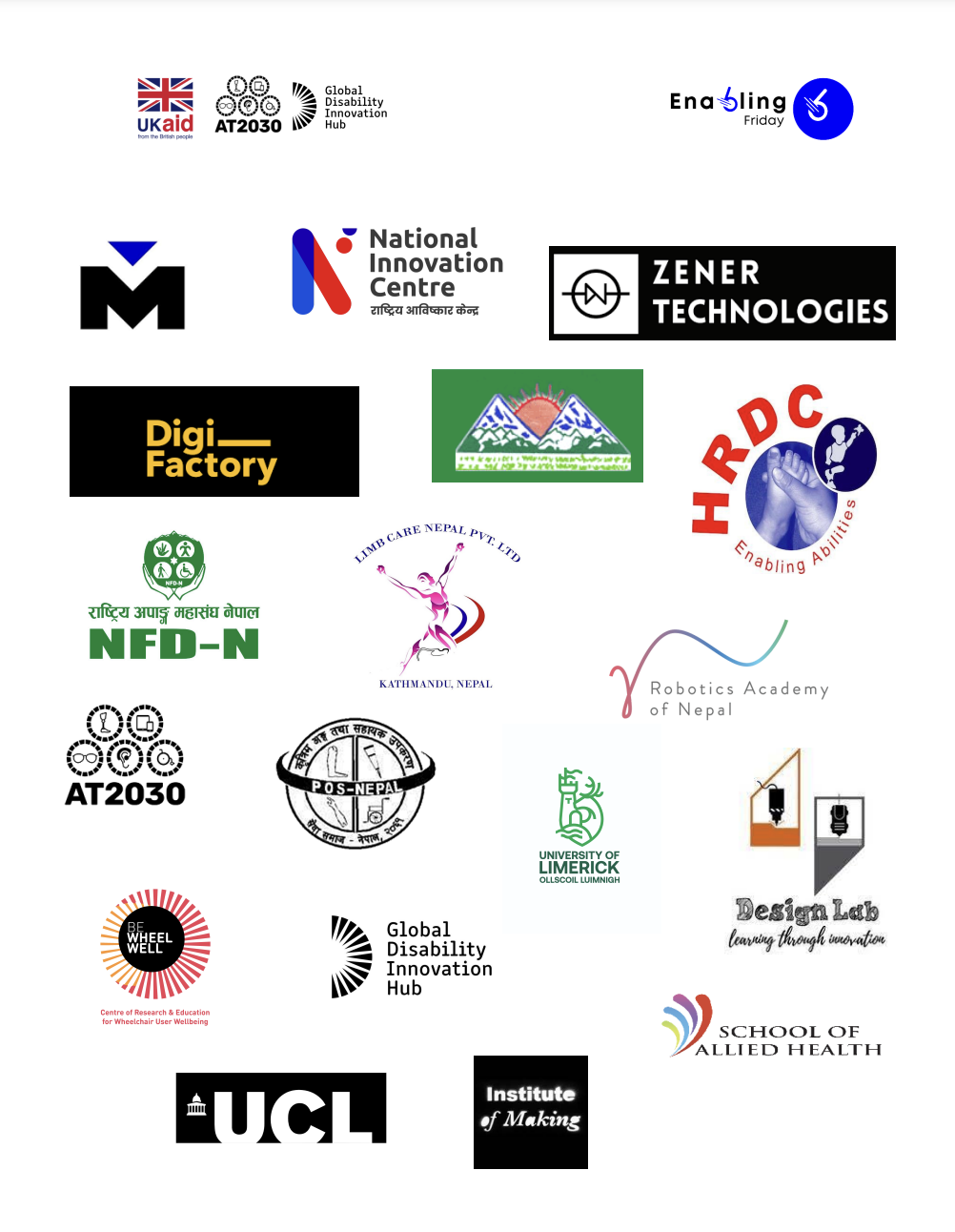
Enabling Fridays Community Nepal
We believe that now is the time to examine where more localized product and service innovation could unlock more sustainable and resilient AT ecosystem infrastructure in Nepal. We believe there is an opportunity to create better connections between the AT community and local manufacturers, with both newer digital and traditional fabrication expertise to enable sustainable technology transfer and promote innovation. The Enabling Fridays Community Nepal want to bring together local and global expertise working in the AT sector to identify routes that would unlock local innovation, and improve current gaps in service. We have convened our initial stakeholder group over 3 sessions to collectively define problem indicators and set an agenda for what the next steps should be. The overarching challenge for AT provision in Nepal is that there is currently no visible pathway to appropriately meet people's needs throughout their lifetime.
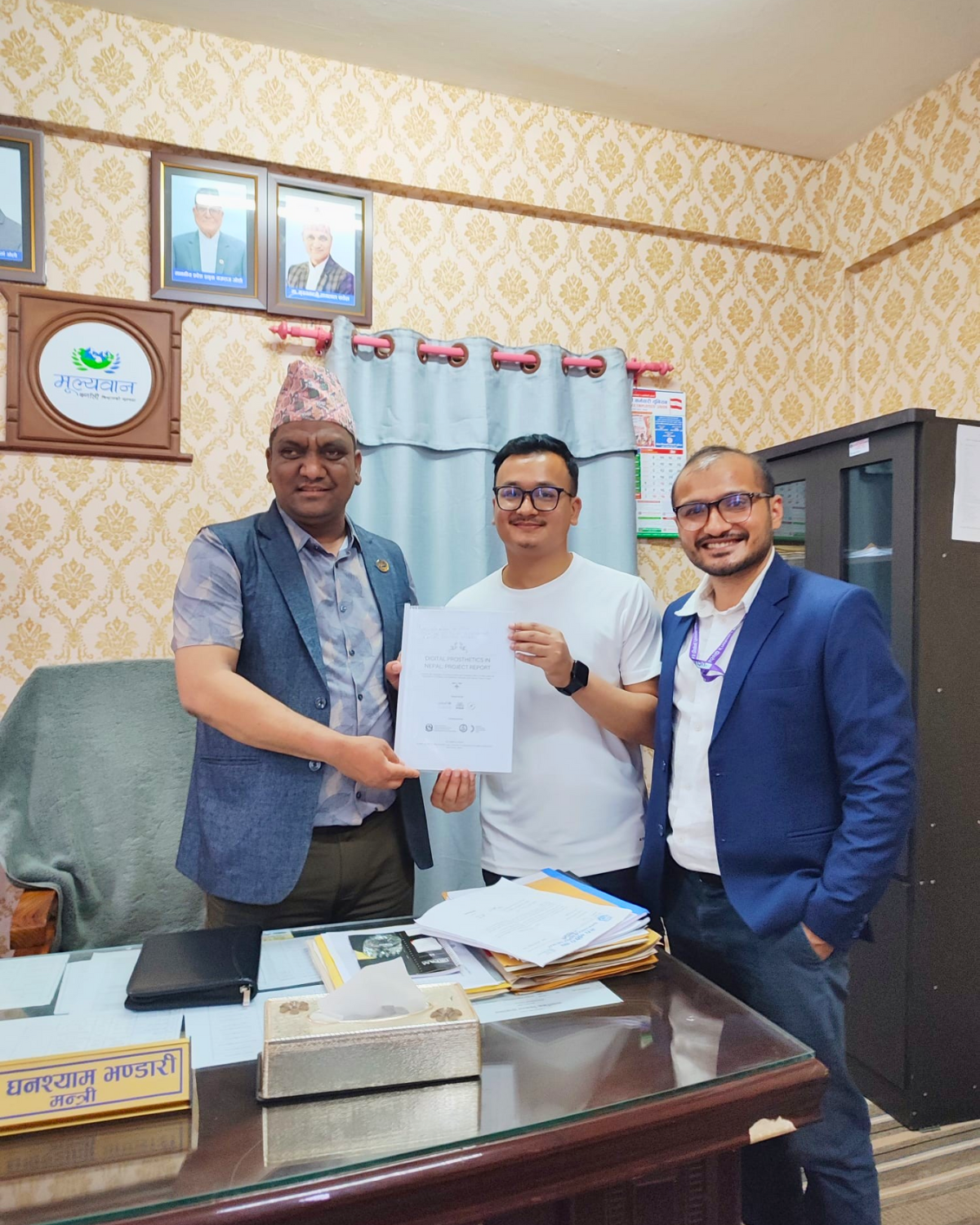
GDI Hub Recognised by Karnali Province Minister for Advancing Assistive Technology Services in Nepal
The Global Disability Innovation Hub (GDI Hub) was thanked by the Honourable Minister for Social Development of Karnali Province for its role in improving access to assistive technology in Nepal. In collaboration with UNICEF Nepal, UGANI Foundation, and the Department of Health Services, GDI Hub helped establish two 3D printing labs in Kathmandu and Surkhet. The GDI Hub continues its commitment to promoting inclusive, technology-driven rehabilitation services in Nepal, working with local stakeholders to create a more accessible and equitable future for all.

Situational Analysis of Manual Wheelchair Provision: Nepal
The Enabling Friday Community (EFC) Nepal has proposed a vision for change based on 4 working sessions over the past few months - Enabling Fridays Vision. While we want to focus on building sustainable assistive technology innovation and systems, we as a group recognised the obvious need for specific data to inform the work. Collaboratively we have agreed that a situational analysis and action plan for sustainable manual wheelchair provision should be prioritised to develop a working methodology and service system template. An initial concept note for the work can be found at the below link on which official consultation is being sought within Nepal before proceeding.
Rising from an earthquake to fight the pandemic in Nepal
In 2015, Nepal, a landlocked country in South Asia bordering China and India, was rocked by an earthquake that destroyed property, historical monuments, claimed thousands of lives, and left scores more injured. Landslides and avalanches ensued, causing severe damage to the capital and nearby towns. The emergency was also the trigger that shifted Zener Technologies’ work, a domestic 3D design and additive manufacturing company co-founded by Ram Chandra Thapa, to solve citizens’ essential needs with technology. Ram Chandra Thapa was a fresh university graduate the year of this ecological disaster. Working as a design and production engineer for Field Ready, an organisation focused on the rapi
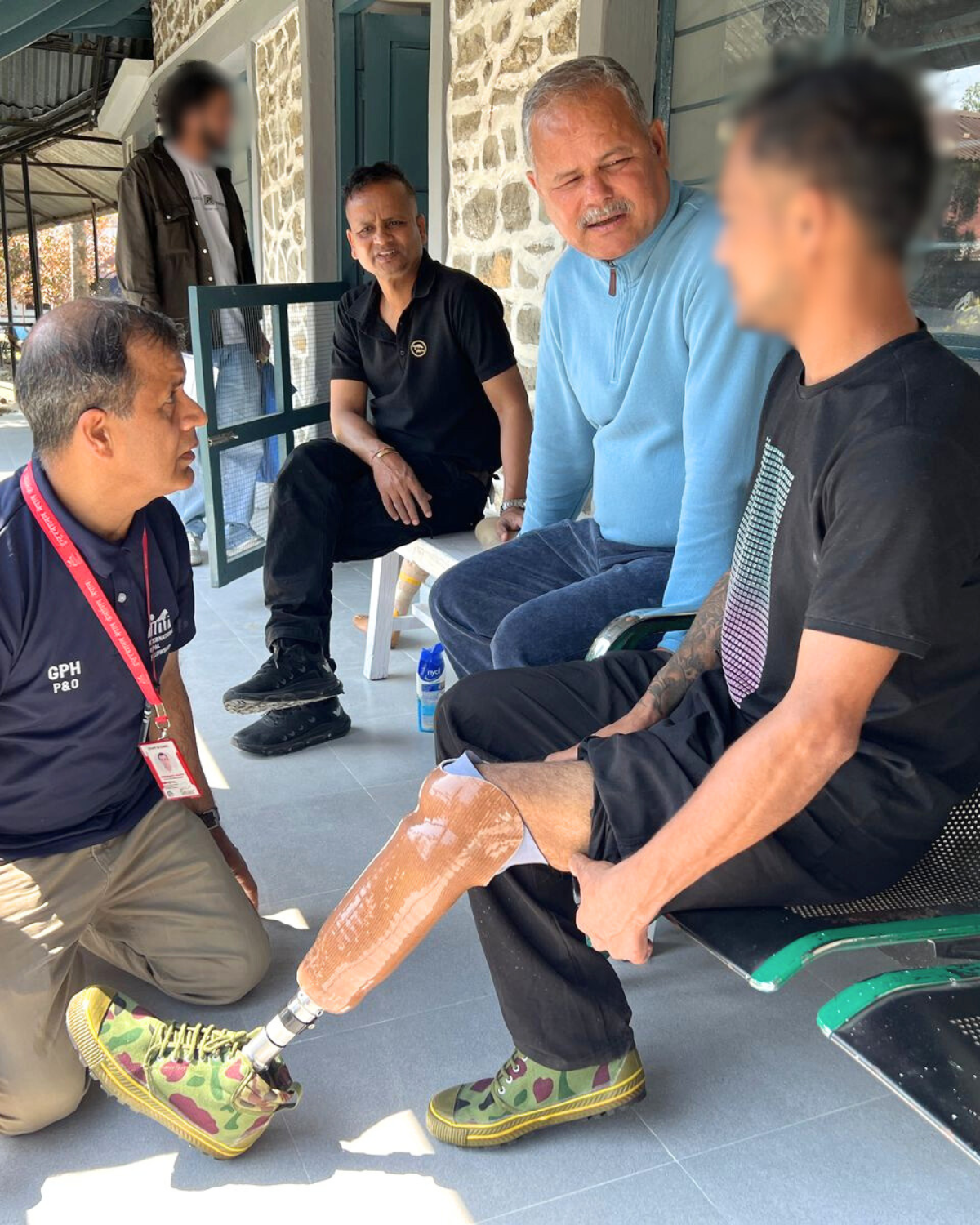
Pioneering Prosthetic Innovation in Nepal: Testing silicone locking liner prosthesis
Our new pilot study at Green Pastures Hospital, Nepal, explores advanced prosthetics for people with limb loss and leprosy. Led by GDI Hub with INF and Operation Namaste, it tests a locally made silicone locking liner to improve care in low-resource settings. Experts and patients joined for research, workshops, and discussions to assess its impact.
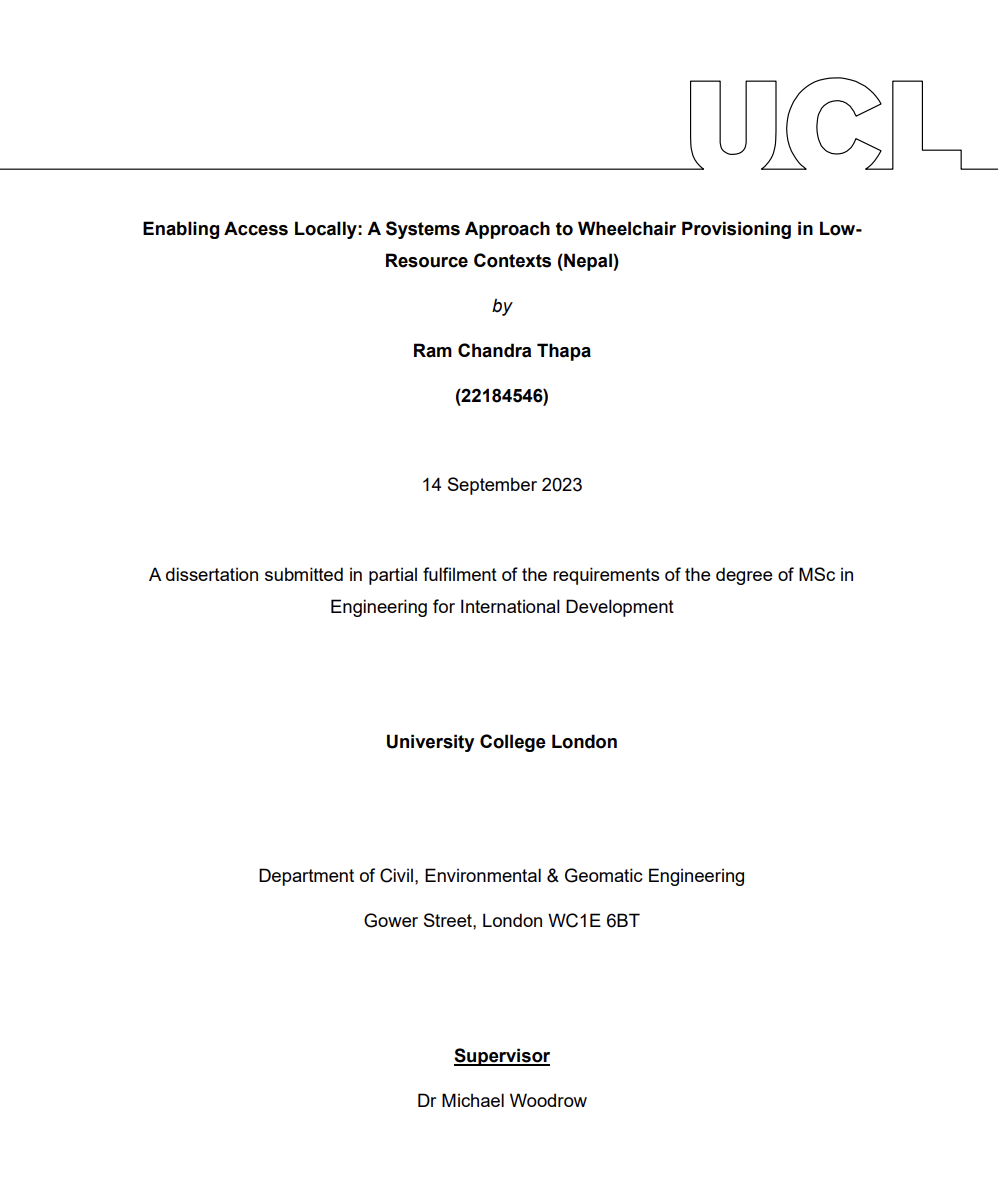
Enabling Access Locally: A Systems Approach to Wheelchair Provisioning in Low-Resource Contexts (Nepal)
Considering that 2.2% of Nepal's population faces disabilities, improving access to assistive technology is both a moral obligation and a priority for sustainable development. At the governmental level, efforts are underway to integrate essential assistive devices into the healthcare system aligning with WHO guidelines. However, there remain significant challenges in implementing these policies, despite constitutional guarantees of free and equitable access to assistive technology. This thesis proposes a collaborative approach to establish sustainable wheelchair provision in Nepal.
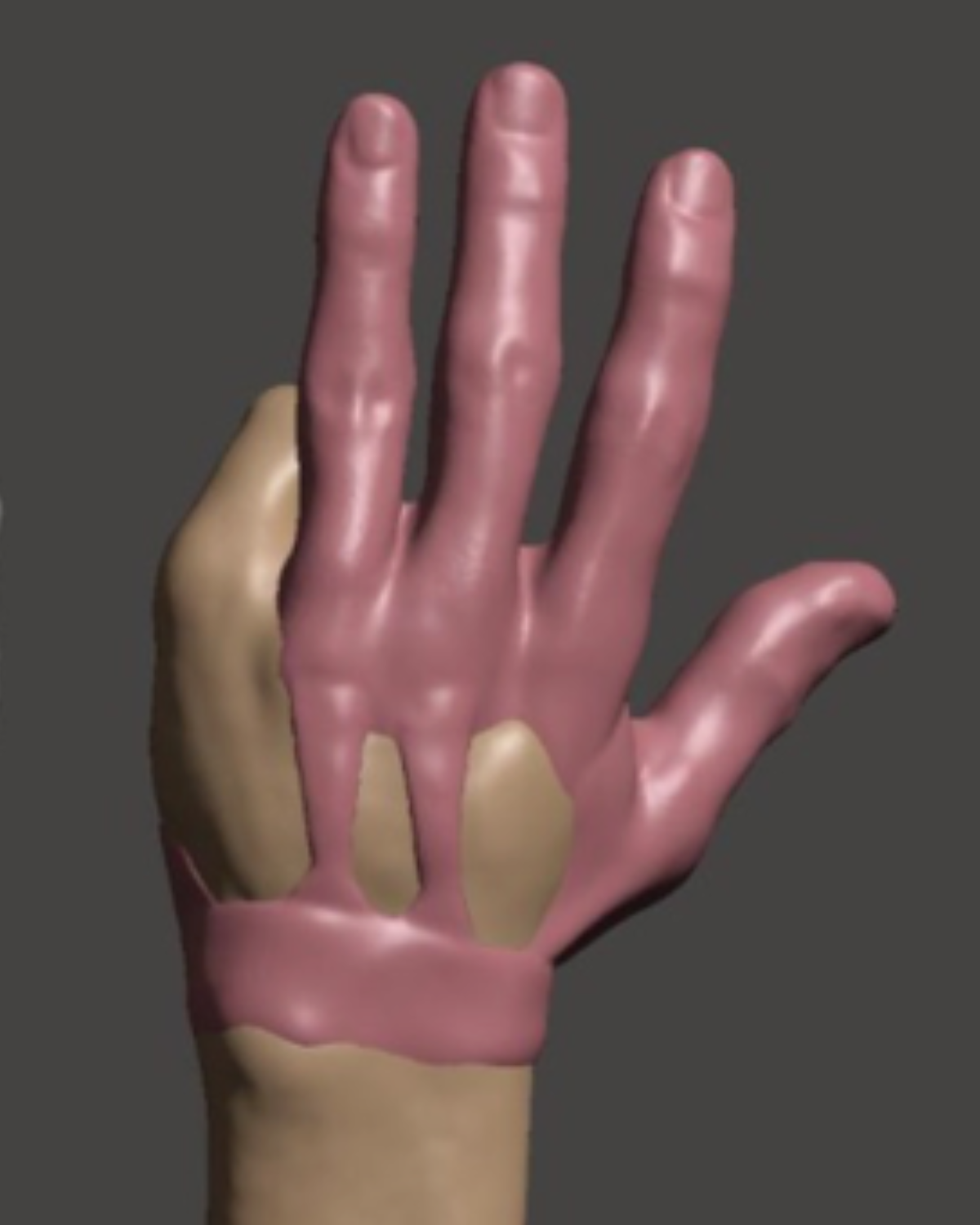
Locally Produced Prosthetics in Nepal
These case study reports highlight locally produced prosthetics in Nepal, developed by GDI Hub, Zener Technologies, and the Enabling Fridays Community. The project blends global and local expertise to address individual needs, improve production processes, and foster innovation. This partnership evolved into a focused effort on assistive technologies, with two bespoke cases in Kathmandu featured in the reports.
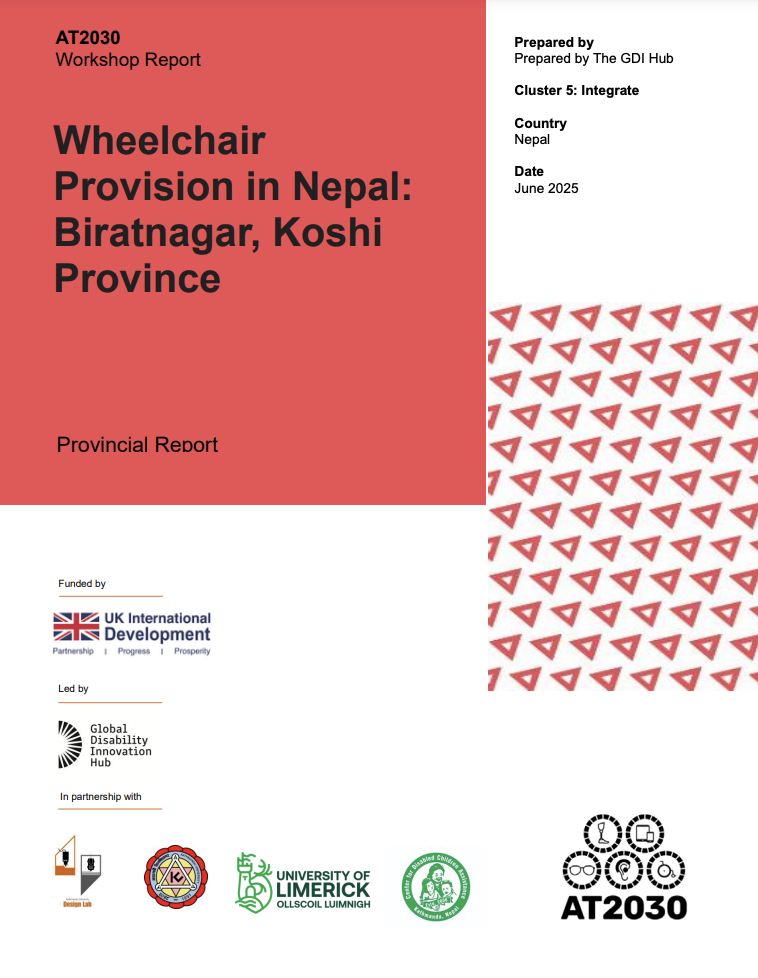
Wheelchair Provision in Nepal: Biratnagar, Koshi Province
Applying the Sustainable Community of Practice (SCOP) model to view wheelchair provision in Nepal, this study seeks to understand the landscape of overall wheelchair product and service provision, deep diving into its provincial situation. This report provides an insight on the provincial workshops conducted in the Biratnagar using the SCOP model and Soft Systems Methodology (SSM) which were pivotal in collaboratively identifying context-specific solutions and stakeholder-driven recommendations.
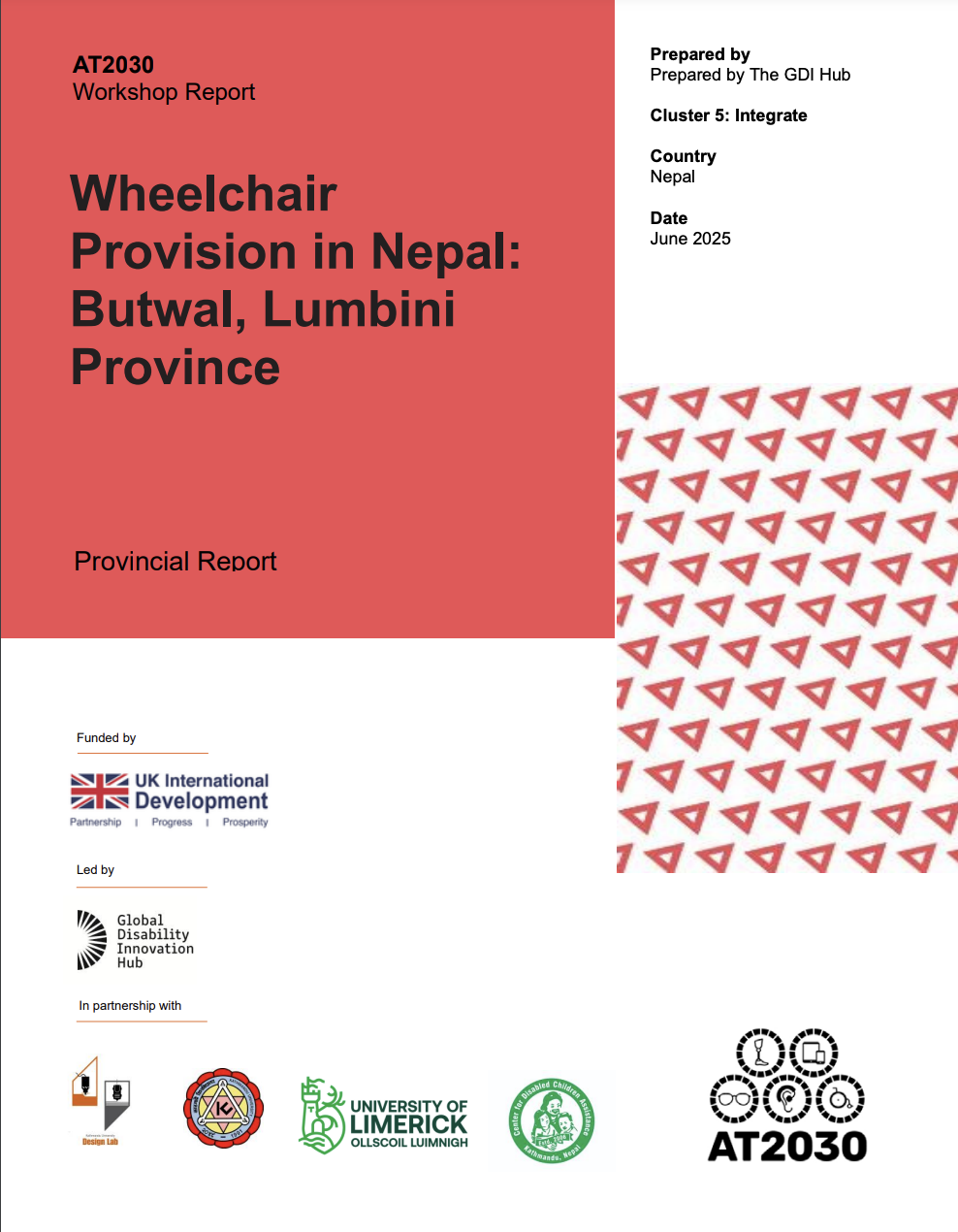
Wheelchair Provision in Nepal: Butwal, Lumbini Province
Applying the Sustainable Community of Practice (SCOP) model to view wheelchair provision in Nepal, this study seeks to understand the landscape of overall wheelchair product and service provision, deep diving into its provincial situation. This report provides an insight on the provincial workshops conducted in the Butwal using the SCOP model and Soft Systems Methodology (SSM) which were pivotal in collaboratively identifying context-specific solutions and stakeholder-driven recommendations.
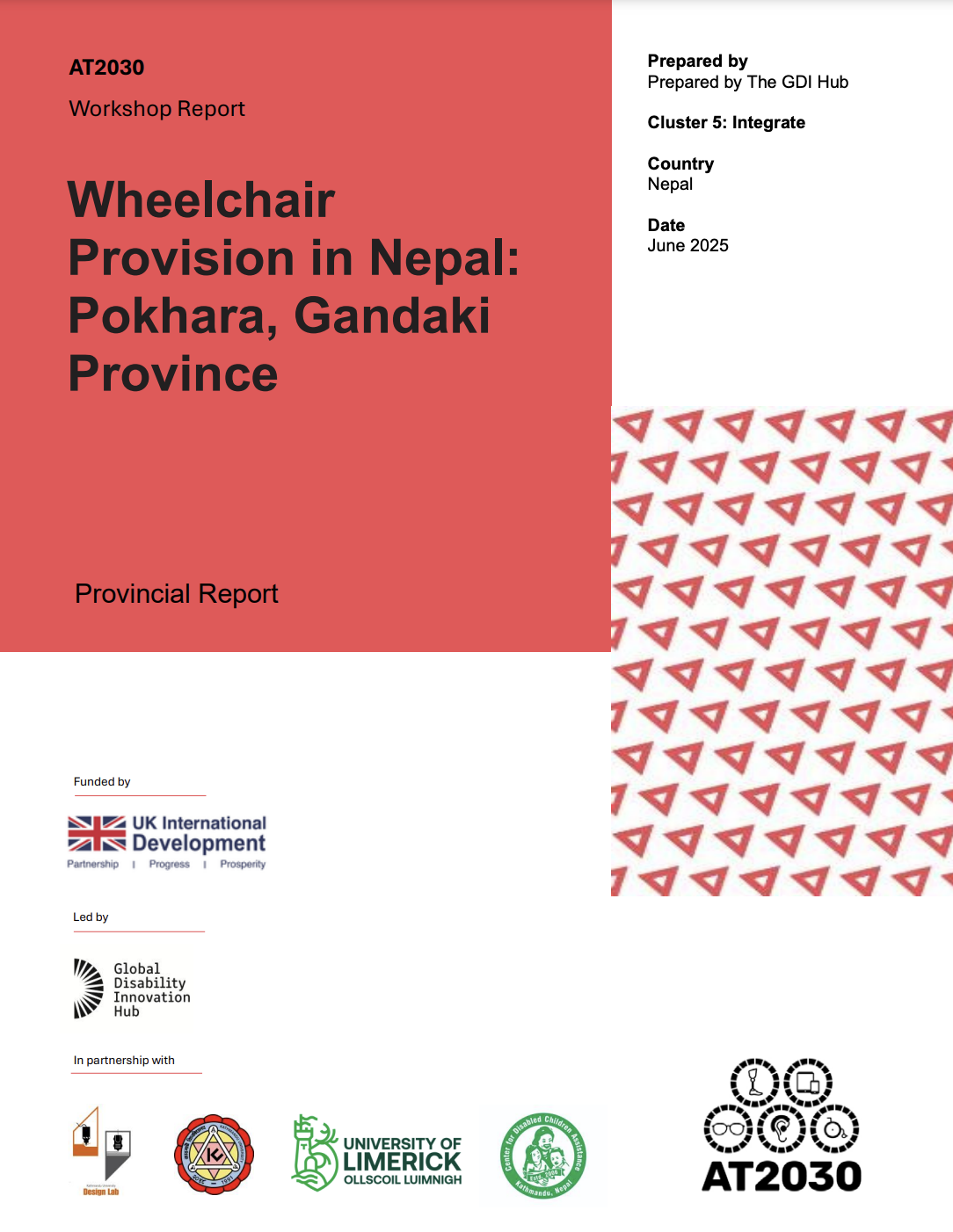
Wheelchair Provision in Nepal: Pokhara, Gandaki Province
Applying the Sustainable Community of Practice (SCOP) model to view wheelchair provision in Nepal, this study seeks to understand the landscape of overall wheelchair product and service provision, deep diving into its provincial situation. This report provides an insight on the provincial workshops conducted in the Pokhara using the SCOP model and Soft Systems Methodology (SSM) which were pivotal in collaboratively identifying context-specific solutions and stakeholder-driven recommendations.
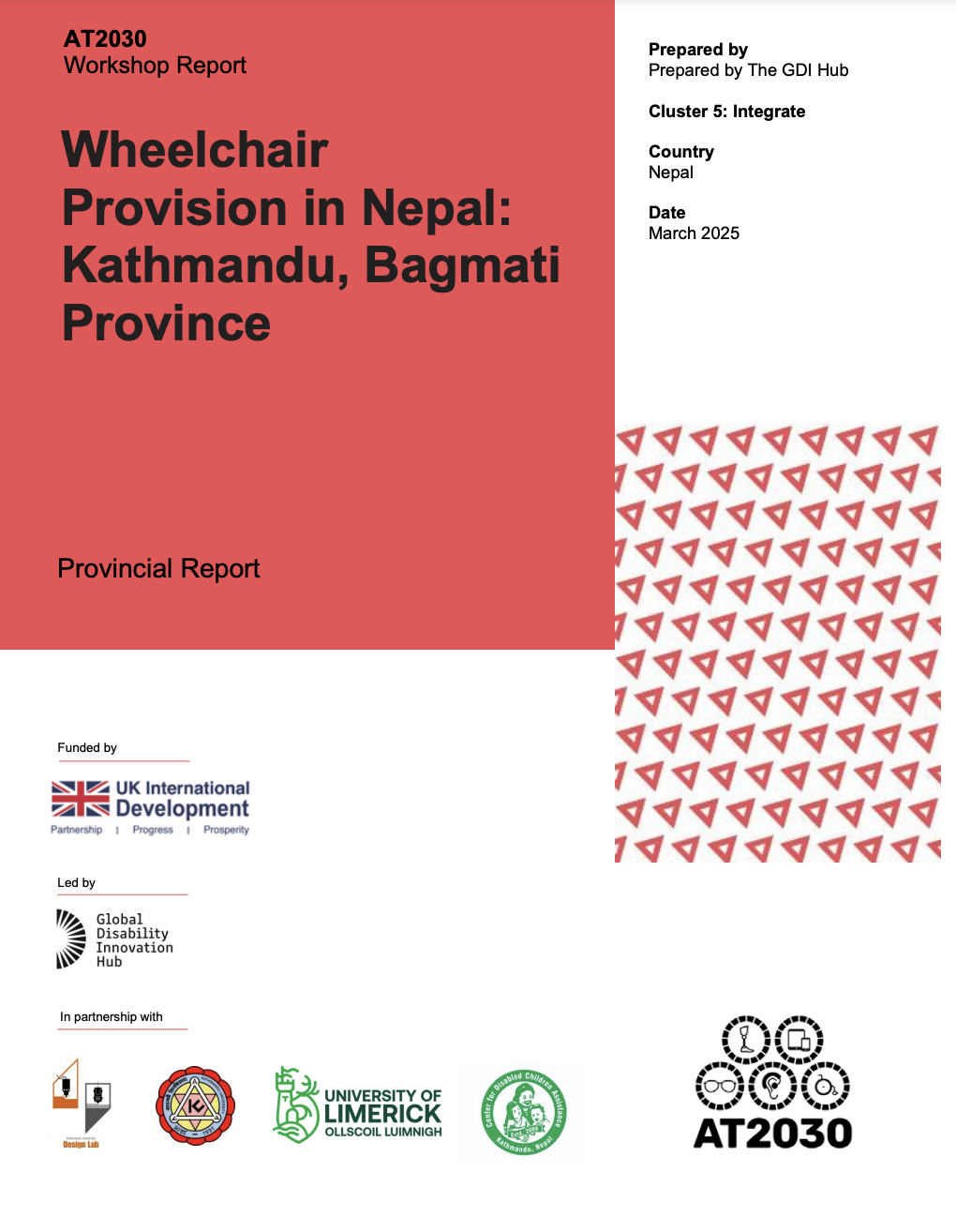
Wheelchair Provision in Nepal: Kathmandu, Bagmati Province
Applying the Sustainable Community of Practice (SCOP) model to view wheelchair provision in Nepal, this study seeks to understand the landscape of overall wheelchair product and service provision, deep diving into its provincial situation. This report provides an insight on the provincial workshops conducted in the Kathmandu using the SCOP model and Soft Systems Methodology (SSM) which were pivotal in collaboratively identifying context-specific solutions and stakeholder-driven recommendations.
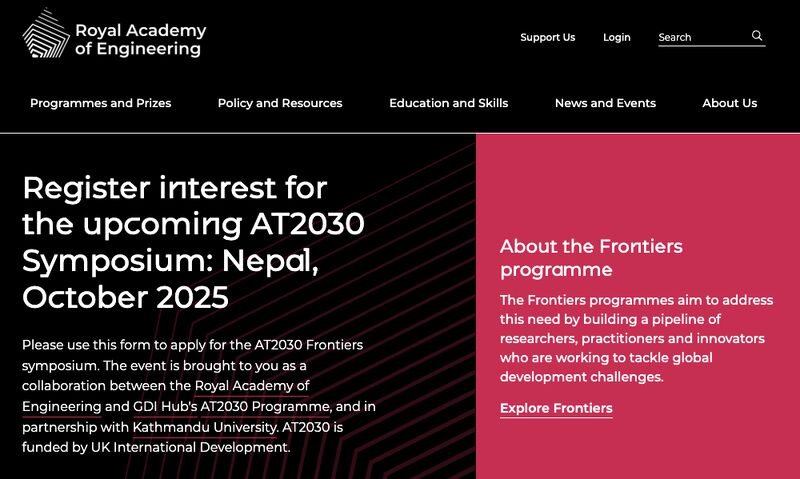
AT2030 Nepal Symposium
This AT2030 Frontiers symposium is a collaboration between the Royal Academy of Engineering and GDI Hub's AT2030 Programme, and in partnership with Kathmandu University (KU). AT2030 is funded by UK International Development.
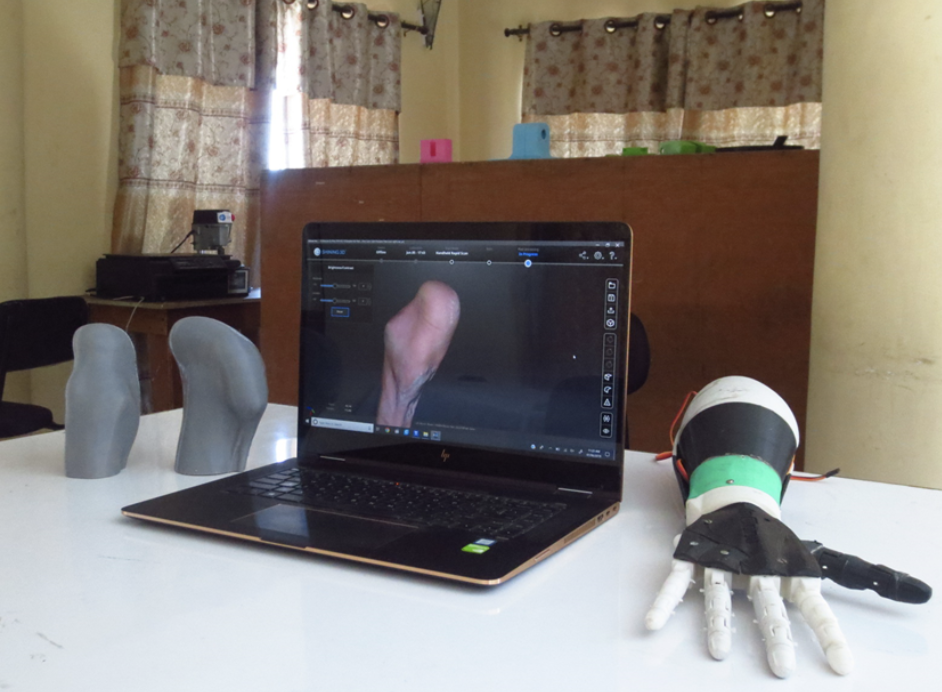
NEPCON Conference 2024
A presentation made at the 2nd NEPOCON (Nepal Prosthetics and Orthotics) conference in May 2024 by five members of the project team led by Ram Chandra Thapa from Zener Technologies in Nepal, and Ben Oldfrey from UCL, on A Global-Local Innovation Approach for Appropriate Technology in LMICs: A Case Study in Nepal.

Unlocking Sustainable and Resilient Assistive Technology Innovation and Delivery Ecosystems: Personalised Co-creation of Locally Produced Prosthetics: Research Summary
The UK Aid-funded AT2030 project improved access to assistive technology in Nepal by developing locally produced prosthetics through collaboration between Nepali experts and global innovators. Emphasizing user-centred design, prosthetic users helped shape the final devices, ensuring they met both functional and personal needs. The project provided effective prosthetics while strengthening Nepal’s innovation capacity, securing further funding to expand the initiative.
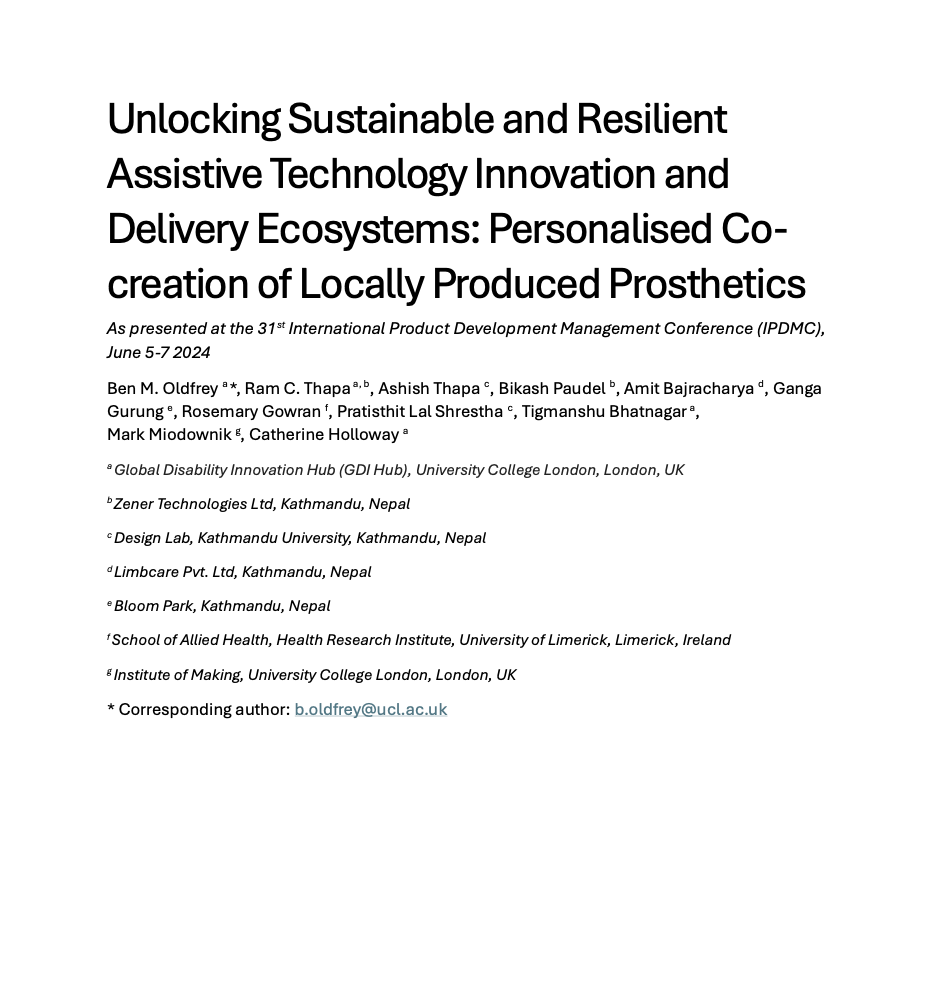
Unlocking Sustainable and Resilient Assistive Technology Innovation and Delivery Ecosystems: Personalised Co-creation of Locally Produced Prosthetics
The World Health Organisation (WHO) reports significant disparities in access to assistive products, with 64% access in high-income countries compared to 33% in medium-income and 11% in low-income countries. The AT2030 Programme, led by the Global Disability Innovation Hub in Nepal, aims to enhance local innovation in assistive technology (AT). In Nepal, the estimated disability rate is only 2.2%, likely underestimated, as organisations work to provide tailored AT and rehabilitation services. This paper outlines our experiences in the AT2030 project, focusing on developing a global-local community, interdisciplinary innovation teams in Kathmandu, and preliminary findings from bespoke product development cases.
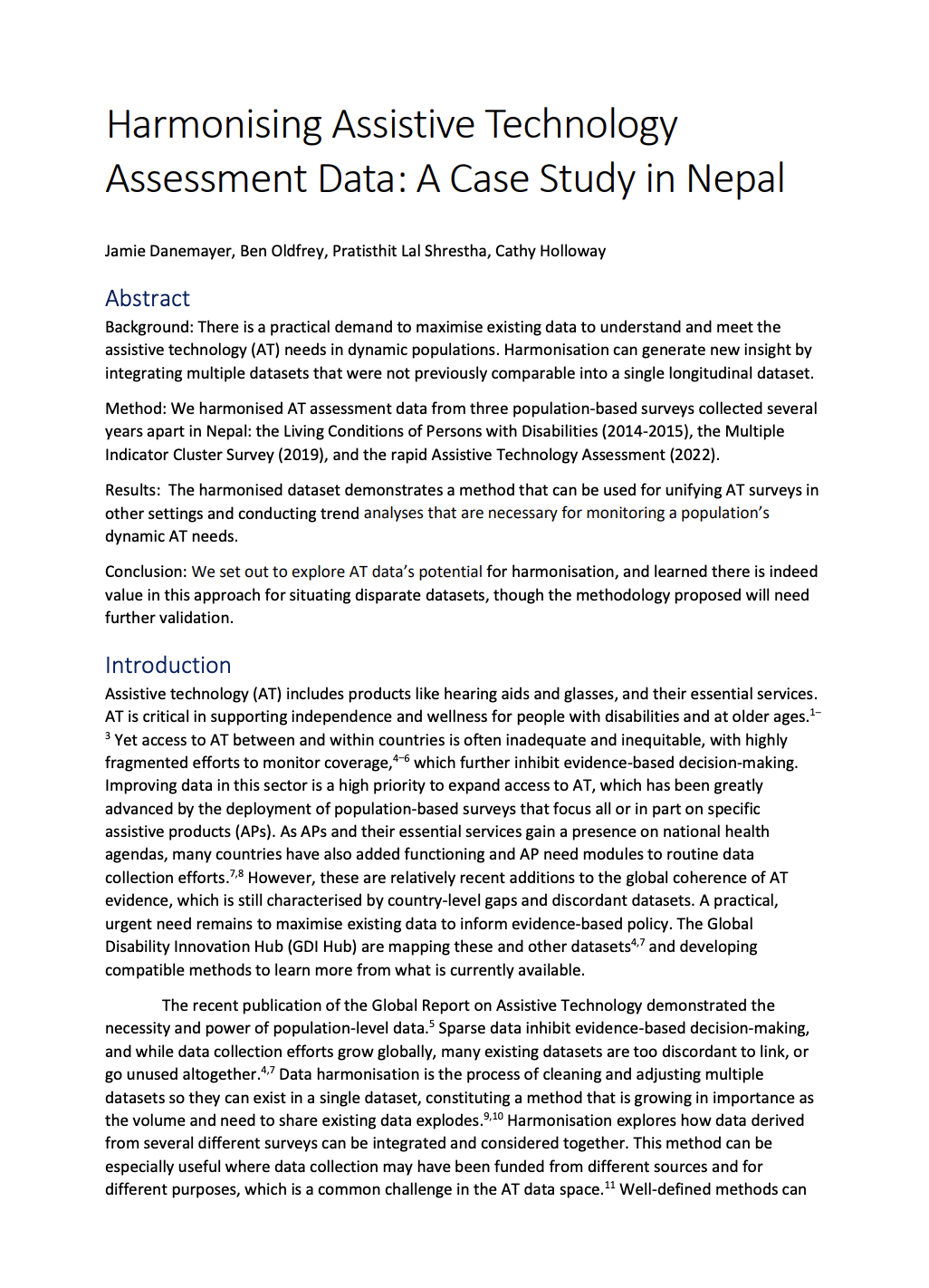
Harmonising Assistive Technology Assessment Data: A Case Study in Nepal
This study by GDI Hub harmonises data from three surveys in Nepal to improve insights into assistive technology (AT) needs, revealing limited access and unmet demand, especially for hearing aids. By creating a unified dataset, it supports evidence-based policy, enhances AT access, and guides innovators on market opportunities. This approach offers a model for strengthening AT data globally.
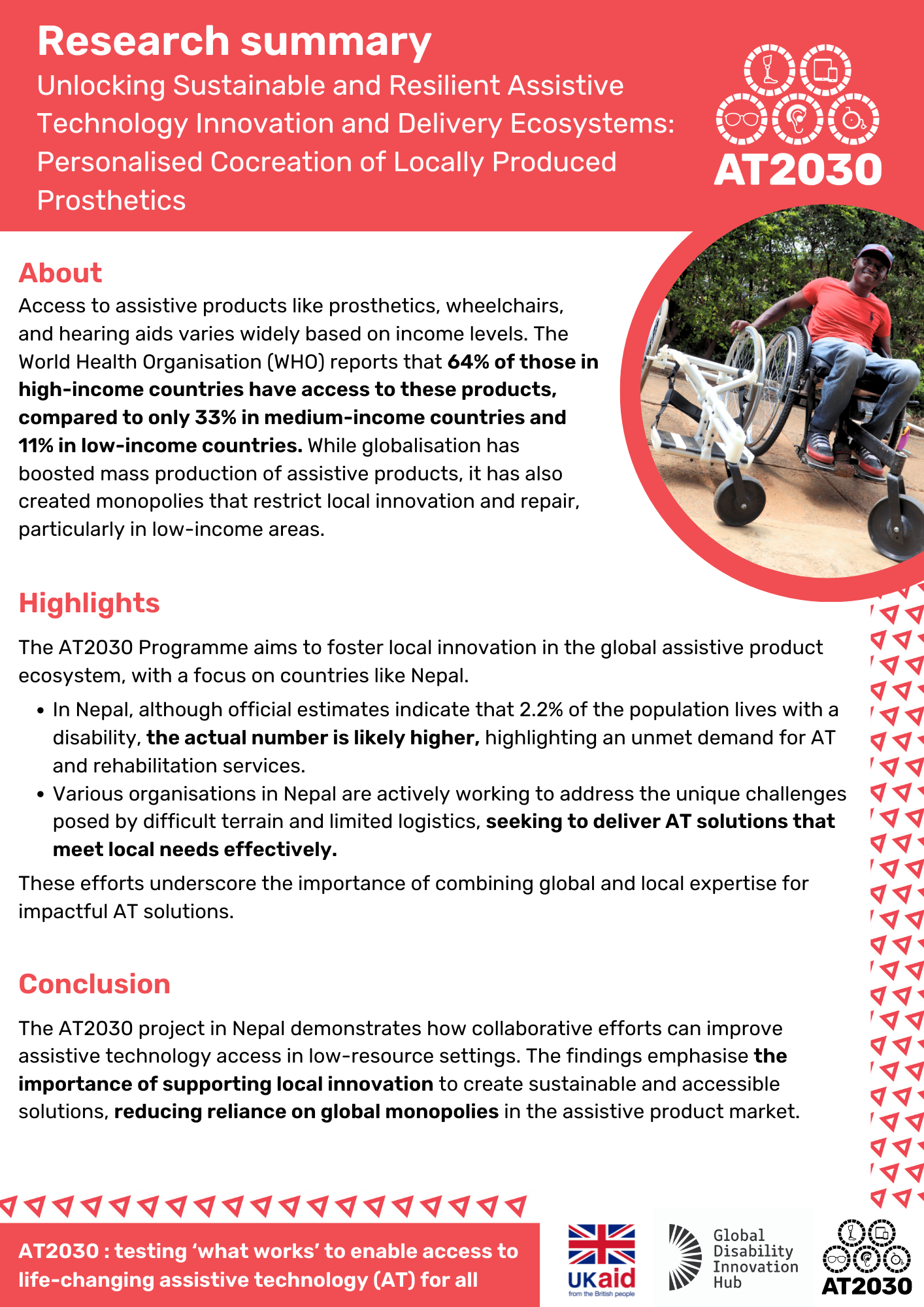
Unlocking Sustainable and Resilient Assistive Technology Innovation and Delivery Ecosystems: Personalised Cocreation of Locally Produced Prosthetics: Research Summary
Access to assistive products like prosthetics and wheelchairs is unequal globally, with only 11% access in low-income countries. The AT2030 Programme promotes local AT innovation, focusing on needs in countries like Nepal, where disability rates are likely underestimated. By fostering global-local collaboration, the project aims to improve AT access and reduce dependency on monopolistic production, supporting sustainable, accessible solutions.
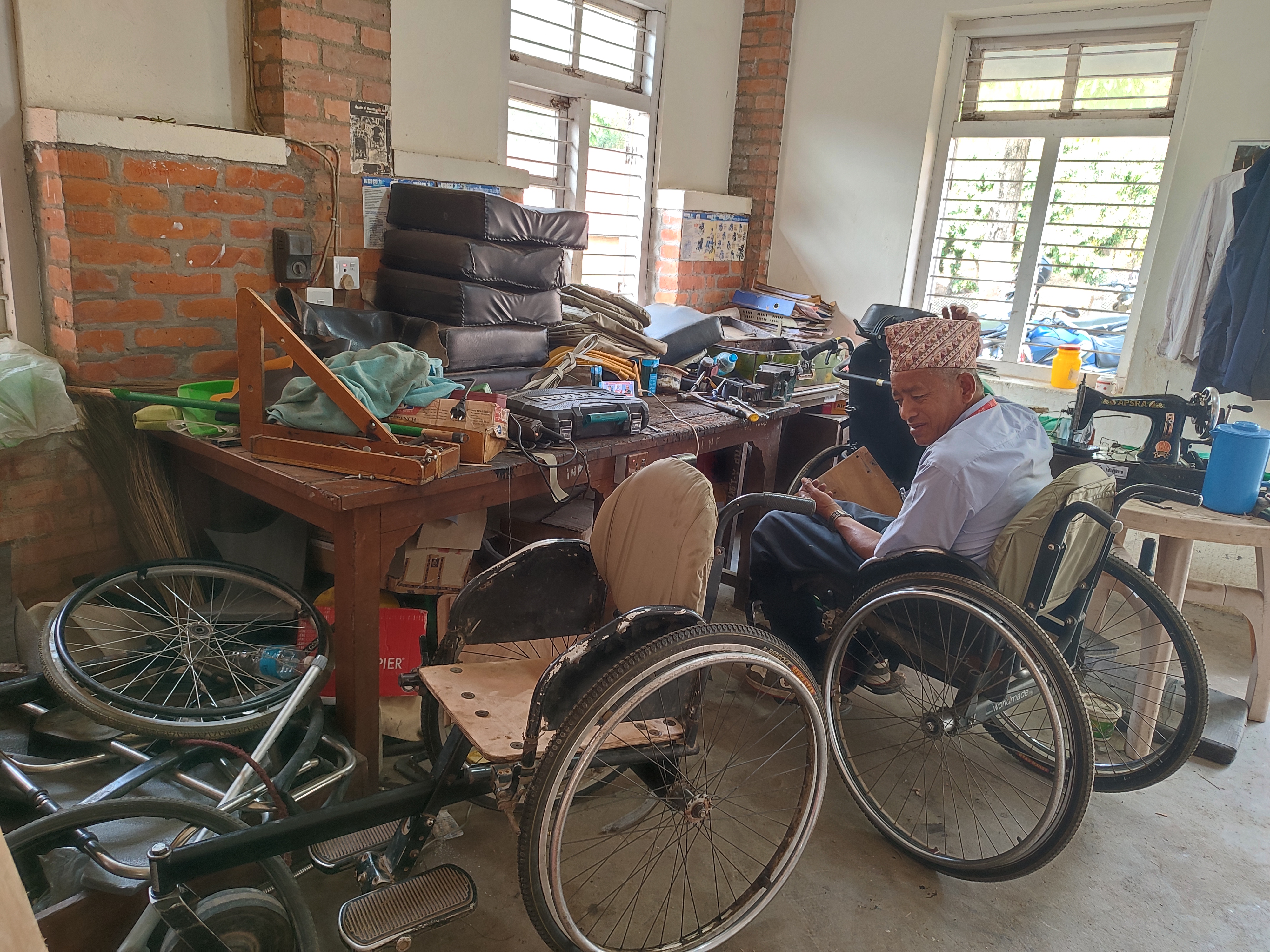
Nepal Wheelchair Provision Workshop Report
Despite supportive policies, wheelchair provision in Nepal is informal and unsustainable. Through interviews and workshops across four provinces, key challenges and solutions were identified, highlighting the urgent need for systemic reform to ensure equitable, sustainable wheelchair services.
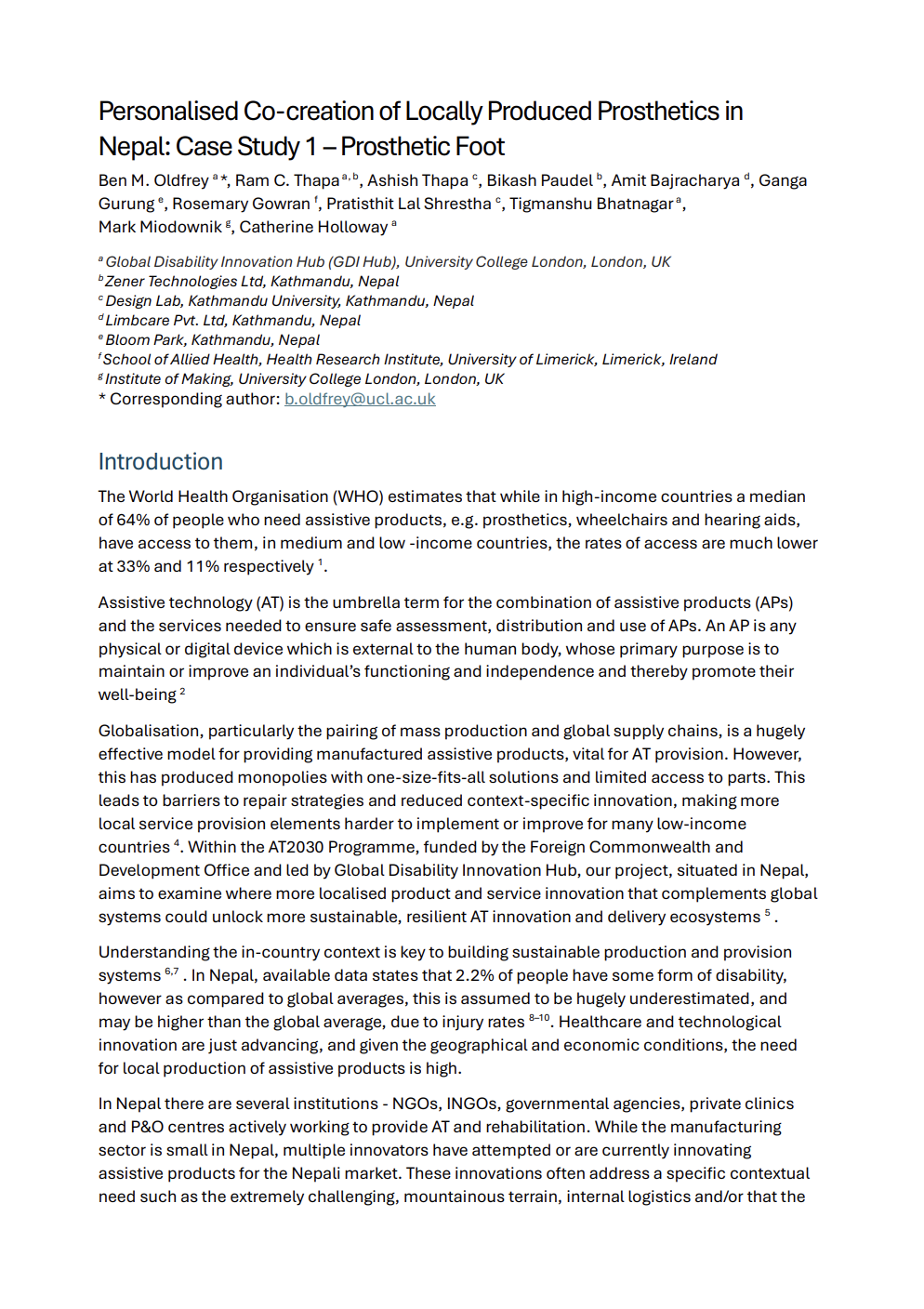
Personalised Co-creation of Locally Produced Prosthetics in Nepal: Case Study 1 – Prosthetic Foot
Access to assistive technology (AT) like prosthetics and wheelchairs is limited in low-income countries—just 11% of those in need can access them. In Nepal, this challenge is worsened by difficult terrain, limited imports, and underreported disability rates.
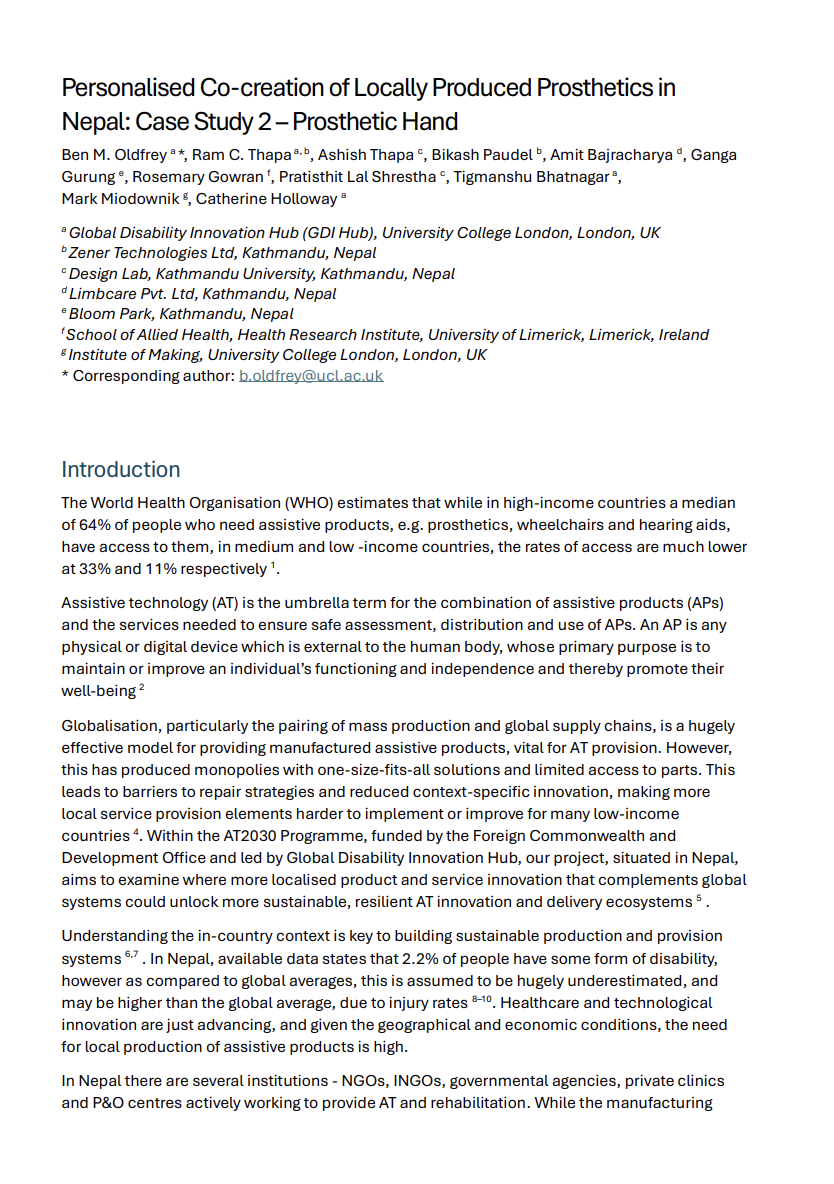
Personalised Co-creation of Locally Produced Prosthetics in Nepal: Case Study 2 – Prosthetic Hand
As part of the AT2030 Local Systems Strengthening project, the Global Disability Innovation Hub supports the development of custom prosthetic hands in Kathmandu. Designed for the local context, these hands are being co-created by a global-local innovation team using digital fabrication and locally sourced materials.
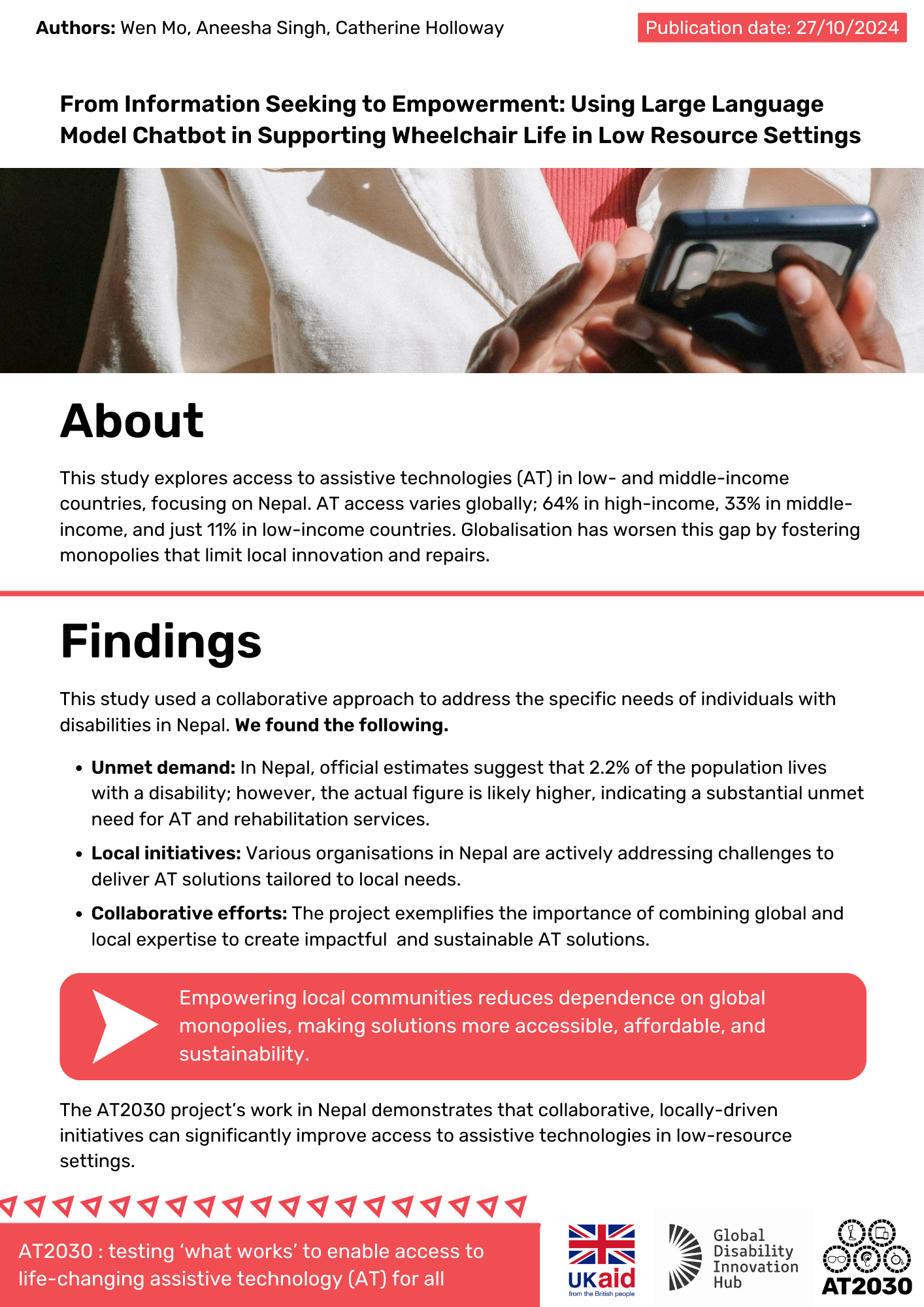
From Information Seeking to Empowerment: Using Large Language Model Chatbot in Supporting Wheelchair Life in Low Resource Settings - Research Summary
This study explores access to assistive technologies (AT) in low- and middle-income countries, focusing on Nepal, where access is much lower compared to high-income countries. Using a collaborative approach, the study found a significant unmet demand for AT in Nepal, with local initiatives successfully addressing specific needs. It highlights that combining global and local expertise creates sustainable solutions, reducing dependence on monopolies and improving accessibility and affordability.
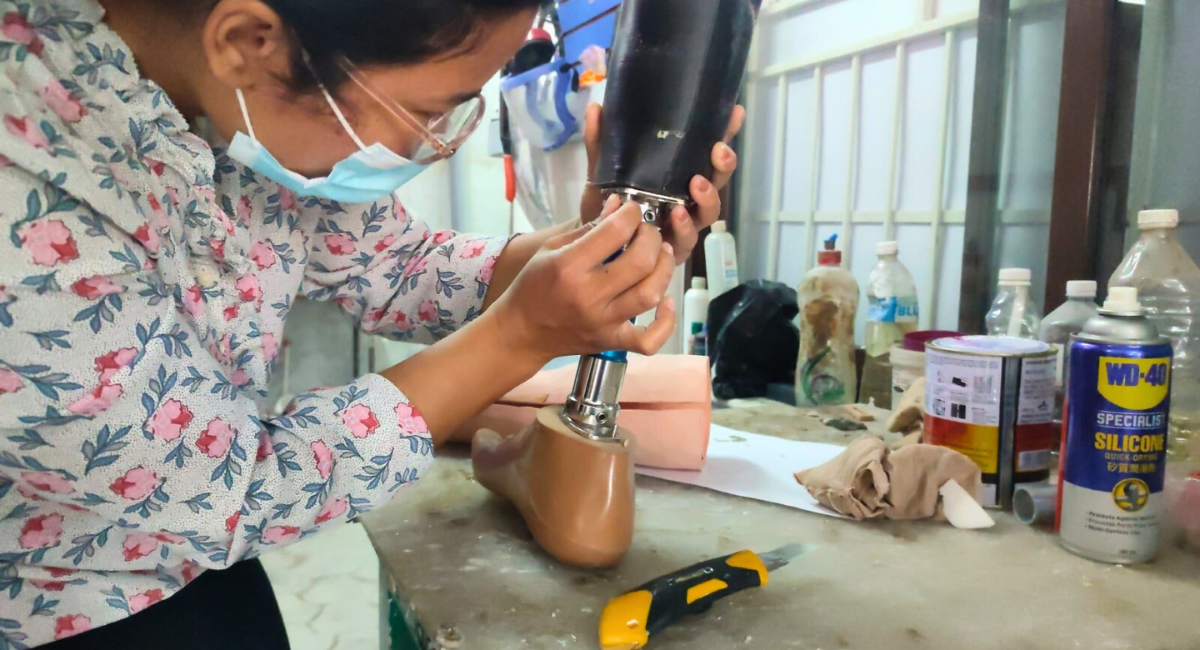
Aakash’s Journey with Transtibial Prosthesis
After losing his leg in a devastating accident during Nepal’s COVID-19 lockdown, Aakash faced immense challenges accessing care and continuing his education. Through the AT2030 programme, he received a 3D-printed prosthetic limb, significantly improving his mobility and independence. His story illustrates the transformative potential of digital assistive technology in low-resource settings.
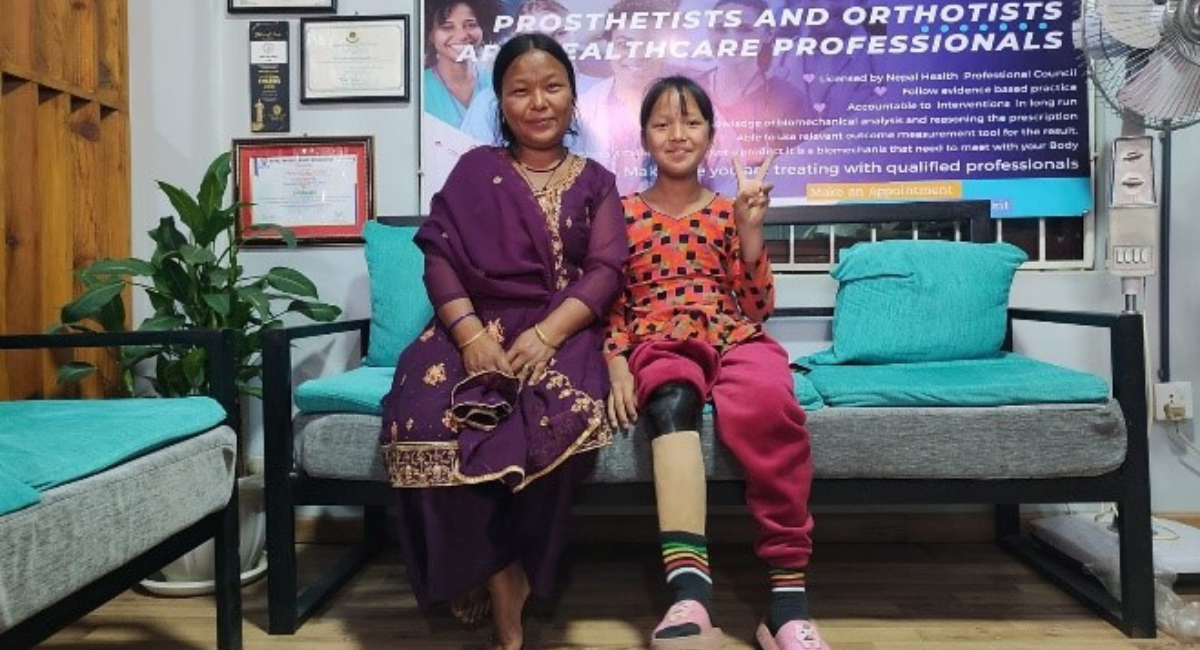
Man Kumari, 11 years old’s Journey: Walking Towards Independence with a 3D-Printed Prosthetic Leg
At just 11 years old, Man Kumari from rural Nepal now walks to school on her own using a 3D-printed prosthetic leg provided through the AT2030 programme. After losing her leg at age five, she spent years reliant on her mother to move around. The new device, designed and fitted using digital technology, has transformed her daily life, enabling her to attend school, help at home, and play with friends. Her story reflects both the promise and ongoing challenges of delivering sustainable, child-focused assistive technology in remote, climate-vulnerable regions.